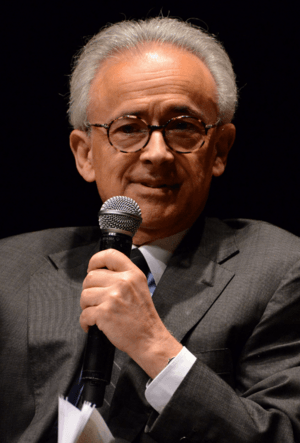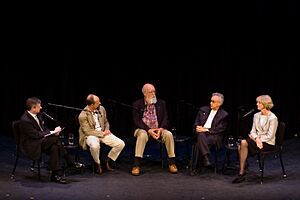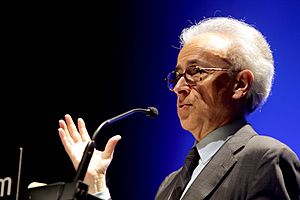Antonio Damasio facts for kids
Quick facts for kids
Antonio Damasio
|
|
|---|---|

Damasio at the Fronteiras do Pensamento conference in 2013
|
|
| Born | 25 February 1944 Lisbon, Portugal
|
| Alma mater | University of Lisbon |
| Spouse(s) | Hanna Damasio |
| Awards | Pessoa Prize (1992) Golden Brain Award (1995) Prince of Asturias Prize (2005) Honda Prize (2010) Grawemeyer Award in Psychology (2014) Paul D. MacLean Award (2019) |
| Scientific career | |
| Fields | Cognitive neuroscience |
| Institutions | University of Southern California, University of Iowa |
| Thesis | Perturbações neurológicas da linguagem e de outras funções simbólicas (1974) |
| Councilor of State | |
| In office 24 April 2017 – 14 February 2024 |
|
| President | Marcelo Rebelo de Sousa |
| Preceded by | António Guterres |
| Succeeded by | Joana Carneiro |
Antonio Damasio (born 25 February 1944) is a famous Portuguese neuroscientist. A neuroscientist studies the brain and nervous system. He is a professor at the University of Southern California. He also teaches at the Salk Institute. Before this, he led the neurology department at the University of Iowa for 20 years.
Damasio is in charge of the Brain and Creativity Institute. He has written several books about the brain. His work shows that our feelings are very important. They help us make decisions and understand others.
Contents
Discovering How Our Brains Work
Antonio Damasio studied medicine at the University of Lisbon in Portugal. He finished his doctorate degree in 1974. During his studies, he learned about how brain damage affects behavior. He worked with Norman Geschwind in Boston.
Damasio's main area of study is neurobiology. This field looks at how the nervous system works. He focuses on the brain systems that control emotions, decisions, memory, language, and consciousness.
Emotions and Decisions
Damasio came up with the somatic marker hypothesis. This idea explains how emotions affect our choices. Emotions can help or hurt our decision-making. Often, we don't even realize our feelings are guiding us. Emotions are also key for understanding other people. They are needed for our sense of self and awareness. Damasio showed that our feelings are closely linked to our bodies.
His idea has led to many brain experiments. It has greatly influenced science and philosophy. Damasio is known as one of the most cited researchers. His work has impacted studies on moral decisions and how we communicate.
Feelings and the Body
Damasio also suggested that emotions help keep our bodies balanced. This is called homeostatic regulation. He believed feelings are like a report of our body's state. He showed that a part of the brain called the insular cortex is important for feelings. This finding has been proven by many other studies. He also found other brain areas involved in emotions. These include the ventromedial prefrontal cortex and the amygdala.
He continues to study how feelings work in the brain. He believes feelings are the necessary base for being aware.
How We Learn and Remember
Damasio also explained how the brain learns and remembers. He described how different parts of the brain connect. These connections help us access our thoughts and memories. This system helps us understand how our minds work.
He also described how our sense of self develops. It starts with basic body signals. These signals create a "protoself," which is a simple sense of being. This leads to a "core self" and "core consciousness." Then, we develop an "autobiographical self," which includes our memories and experiences. This allows for "extended consciousness," which is our full awareness.
Studying Brain Injuries
Damasio's research often uses the human lesion method. This means studying people who have had brain injuries. This helps scientists understand which brain parts do what. His wife, Hanna Damasio, helped a lot with this. She used brain scans to map brain structures. They also worked with other scientists to study how brain injuries affect thinking and behavior. For example, they found how Alzheimer's disease affects memory.
As a doctor, he and his team have studied and treated problems with behavior, thinking, and movement.
Books by Antonio Damasio
Damasio's books explore the link between emotions and the brain.
- His 1994 book, Descartes' Error: Emotion, Reason and the Human Brain, was very popular. It has been translated into over 30 languages. It is seen as a very important book.
- His second book, The Feeling of What Happens: Body and Emotion in the Making of Consciousness, was named one of the best books of 2001. It also has many foreign editions. In this book, he suggested that emotions are automatic body processes.
- In 2003, he published Looking for Spinoza: Joy, Sorrow, and the Feeling Brain. In this book, Damasio suggested that the philosopher Baruch Spinoza had ideas similar to modern brain science.
- His book Self Comes to Mind: Constructing the Conscious Brain talks about how our sense of self is key to our conscious minds. He believes feelings are the basic parts of building our self.
Awards and Recognition
Damasio is a member of important groups like the American Academy of Arts and Sciences. He has received many awards. These include the Grawemeyer Award, the Honda Prize, and the Prince of Asturias Award. He also has honorary degrees from many universities around the world. These include the Sorbonne in Paris.
In 2013, a high school in Lisbon, Portugal, was named after him. It is called Escola Secundária António Damásio.
He believes that "scientific knowledge can help humans endure and prevail."
He is married to Hanna Damasio. She is also a well-known neuroscientist. They often work together. She is a professor at the University of Southern California.
In 2017, he became a member of the Council of State of Portugal. This is an important advisory group to the President. He replaced Antonio Guterres, who became the Secretary-General of the United Nations.
Damasio is also on the board of directors for the Berggruen Institute. He helps choose the winner of the Berggruen Prize for Philosophy.
See also
 In Spanish: António Damásio para niños
In Spanish: António Damásio para niños
- Brain and Creativity Institute
- Damasio's theory of consciousness
- Insular cortex
- Hanna Damasio
- Joseph E. LeDoux
 | Emma Amos |
 | Edward Mitchell Bannister |
 | Larry D. Alexander |
 | Ernie Barnes |



